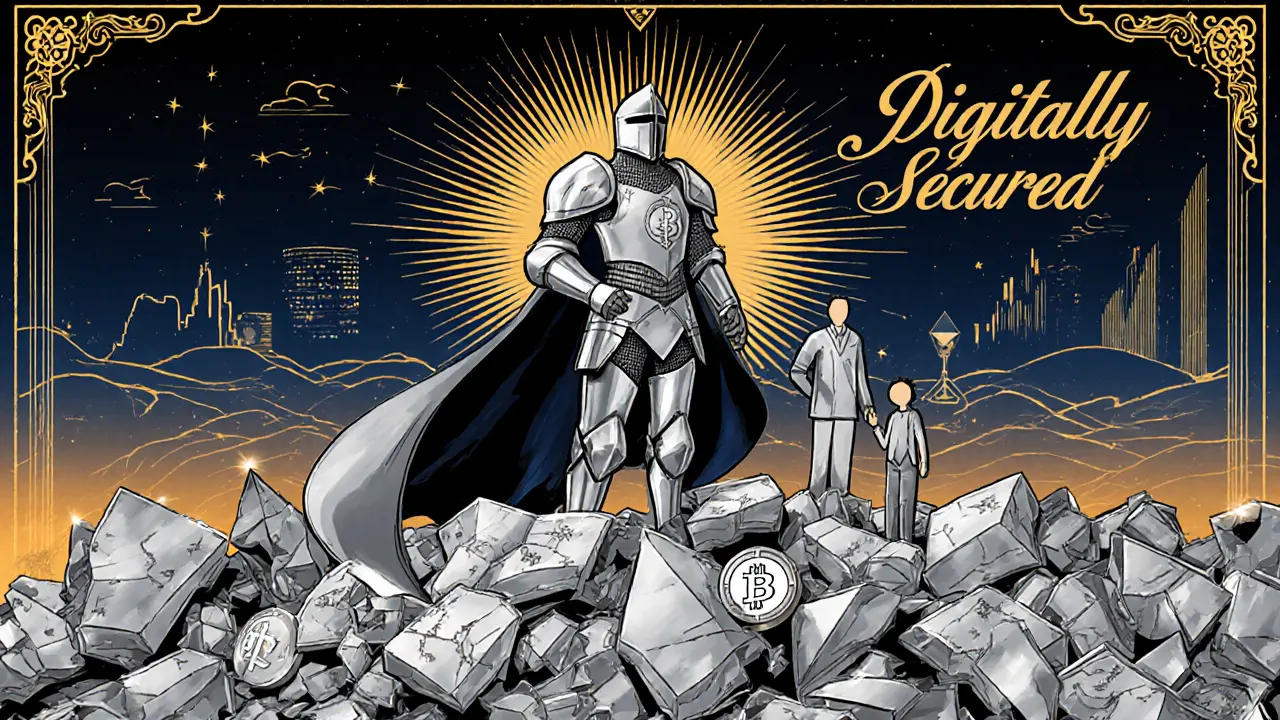Crypto Seizure Policy Comparison Tool
How Countries Handle Seized Cryptocurrency
Compare the different approaches governments take to seized cryptocurrency, including whether they hold assets long-term or sell them immediately, legal frameworks, and key seizure statistics.
When the U.S. government quietly added over 207,000 Bitcoin to its reserves in March 2025, it wasn’t buying on the open market. It was taking what criminals stole. That single move changed how the world sees seized cryptocurrency-not as contraband to be sold off, but as a strategic national asset. Across the globe, governments are now holding onto crypto seized from hackers, scammers, and darknet markets instead of cashing out immediately. And the reasons why vary wildly from country to country.
How Governments Are Treating Seized Crypto
In the past, seized Bitcoin and Ethereum were auctioned off within weeks. The goal? Get rid of it fast, avoid market disruption, and turn it into cash for law enforcement budgets. But that changed in 2025. The U.S. created the Strategic Bitcoin Reserve, a government-held pool of over $17 billion in forfeited cryptocurrency. This isn’t just storage-it’s policy. The reserve is used to fund future investigations, pay victims of crypto scams, and even act as a hedge against inflation. The idea? Let the assets grow in value while keeping them off the open market.
Other countries are watching closely. Spain’s Guardia Civil, working with U.S. agencies, seized over $300 million in crypto in early 2025 from a single international ransomware ring. Instead of selling it all at once, they’re studying whether to hold some long-term. Germany and Canada are exploring similar models. Meanwhile, Japan and South Korea are sticking to liquidation-selling seized assets quickly to avoid price swings. But even there, regulators are debating whether to keep a small reserve for victim restitution.
The legal basis for these seizures has also evolved. Courts now routinely treat crypto as property under existing forfeiture laws. That means if you’re caught laundering Bitcoin through a mixer or using it to pay for illegal drugs, the government can take it-just like they’d take a cash stash or a luxury car. Even NFTs and DeFi tokens are fair game now. In 2024, the first NFT forfeiture case was upheld in the U.S. District Court in New York. The NFT, a rare digital artwork linked to a phishing scheme, was seized and later auctioned to fund a victim compensation fund.
Which Countries Are Seizing the Most Crypto?
The U.S. leads in total value seized-not because it has the most crime, but because it has the most tools to fight it. Federal agencies like the FBI, IRS, and DEA have dedicated crypto forensic teams. The Treasury’s Financial Crimes Enforcement Network (FinCEN) tracks cross-border crypto flows in real time. In H1 2025 alone, U.S. agencies seized over $1.2 billion in cryptocurrency, mostly Bitcoin and Ethereum.
But the U.S. isn’t the only player. Germany ranked second, seizing $410 million, mostly from darknet market takedowns and money laundering rings using stablecoins. Russia’s Federal Security Service (FSB) seized over $280 million, mostly from cybercriminals operating out of Eastern Europe. Their approach? Publicly announce seizures to deter others, then liquidate everything within 30 days. They don’t hold assets-they warn.
Japan’s Financial Services Agency (FSA) seized $230 million, mostly from unlicensed exchanges and Ponzi schemes disguised as investment platforms. South Korea’s Financial Intelligence Unit (FIU) took $190 million, focusing on crypto mixers and offshore wallet chains. Indonesia and Canada followed closely, with seizures tied to ransomware gangs targeting hospitals and schools.
What’s surprising? Countries with lower crypto adoption are still seeing big seizures. In Lithuania, a small nation of 2.8 million people, authorities seized $85 million in 2025-mostly from fraudsters targeting U.S. and EU investors. In Chile, despite limited local crypto use, victims lost more per capita than anywhere else. That’s because Chileans were targeted by international scammers using fake crypto lending apps.

Where Crypto Theft Is Happening-And Who’s Getting Hit Hardest
Seizures don’t happen in a vacuum. They follow the money-and the crime. In H1 2025, criminals stole $2.17 billion from crypto users globally. That’s more than the entire year of 2024. The U.S., Germany, and Russia had the highest number of victims. But when you look at how much each victim lost on average, the picture changes.
The UAE, Israel, and Norway had the highest average loss per victim-over $45,000 each. Why? Because those countries have a high concentration of wealthy crypto investors, often holding large positions in Bitcoin or institutional-grade DeFi protocols. Attackers don’t target small wallets-they go for the big ones.
Eastern Europe, the Middle East, and Central Asia saw the fastest growth in thefts. Ukraine, despite being at war, leads the world in crypto adoption. That makes it a magnet for hackers. Moldova and Georgia, both with high adoption rates and weak enforcement, became hotspots for crypto laundering. In contrast, Sub-Saharan Africa had the lowest total value stolen-not because crime is low, but because most users hold small amounts. The average African crypto holder lost $200. That’s devastating for an individual, but it doesn’t show up in global dollar totals.
North America leads in Bitcoin theft. Europe leads in Ethereum and stablecoin theft. Why? Because European users are more likely to use DeFi platforms and stablecoins for daily payments. That makes them easier targets for smart contract exploits and flash loan attacks. Asia, meanwhile, is catching up fast in altcoin theft-especially meme coins and new tokens with weak security.
Legal Status Varies Wildly-Even Within Regions
Just because a country allows crypto doesn’t mean it allows seizures. In Mauritius, crypto is regulated like any other financial asset. The government can freeze accounts and seize holdings under the Financial Services Act 2007-but only with court approval. Investors are warned they won’t get compensation if they lose funds, but the state won’t take them without due process.
South Africa is the opposite. The Reserve Bank says Bitcoin has “no legal status.” Yet the tax office treats it as an intangible asset. That creates a gray zone: you can be taxed on your crypto gains, but if you’re accused of fraud, the government can’t legally seize it-unless they prove it was used in a crime. That’s led to dozens of court battles.
Angola? Fully legal. No laws ban crypto. But the government advises citizens not to use it. Seizures happen, but rarely-and only if linked to terrorism or drug trafficking. Namibia, on the other hand, bans exchanges outright. You can hold crypto, but you can’t buy or sell it locally. If you’re caught using an exchange, your wallet can be frozen and assets seized without a court order.
These differences matter. A hacker in Germany can be tracked across borders thanks to EU-wide data sharing. A hacker in Angola? Not so much. That’s why international cooperation is growing. The U.S.-Spain operation in 2025 was a turning point. Spanish authorities froze wallets linked to a U.S.-based ransomware group. U.S. agents provided blockchain analysis tools. Together, they recovered $300 million. That’s the new norm: cross-border crypto task forces.

The Bigger Picture: Why Holding Crypto Makes Sense
Why hold seized Bitcoin instead of selling it? Simple: timing matters. If the U.S. sold all 207,000 BTC at once, the market could crash. Bitcoin’s price might drop 15-20% overnight. That hurts everyone-victims, investors, even law enforcement, because restitution funds lose value.
By holding, the U.S. government is betting that Bitcoin will go up. It already has. Since the Strategic Bitcoin Reserve was created, Bitcoin’s price has risen over 40%. That means the reserve is now worth more than $24 billion. That’s not just profit-it’s funding. The reserve is now being used to pay for AI-driven blockchain analysis tools, hire blockchain forensic specialists, and even support victim recovery programs.
Other countries are starting to see the logic. Japan’s Financial Services Agency is now studying whether to create its own reserve. Canada’s RCMP is testing a pilot program to hold seized Ethereum for 12-18 months before liquidation. Even China, which bans crypto trading, is quietly exploring ways to seize and hold foreign crypto assets used by its citizens to evade capital controls.
What’s Next for Crypto Forfeiture?
The next wave of changes is coming from regulation-not just enforcement. In the U.S., the SEC and CFTC have shifted from “crack down first” to “clarify rules first.” They’ve relaunched the Crypto Task Force and created a new Cyber and Emerging Technologies Unit. New rules now require stablecoin issuers like Circle and Coinbase to hold 100% reserves and undergo monthly audits. Circle filed for an IPO in April 2025. Coinbase, already public, saw its stock rise 35% after the new rules were announced.
Expect more countries to follow. The focus is shifting from punishing users to securing platforms. The goal isn’t to stop crypto-it’s to make it harder to steal. And when theft does happen, governments want to recover it, hold it wisely, and use it to protect the system.
For everyday users, this means one thing: if you’re holding crypto legally, you’re safer than ever. The tools to trace crime are better. The laws are clearer. And the governments are learning to handle digital assets like real property-not just tech noise.
Can the government seize my cryptocurrency if I didn’t break the law?
No. Seizures require evidence that the crypto was involved in a crime-like money laundering, fraud, or ransomware. If you bought Bitcoin legally and kept it in a private wallet, the government can’t take it just because it’s crypto. Due process still applies. Courts have thrown out seizures where no criminal link was proven.
Which countries hold seized crypto long-term instead of selling it?
The United States is the only country with a formal, large-scale reserve of seized crypto-the Strategic Bitcoin Reserve. Spain and Germany are testing similar models but haven’t committed fully. Japan and South Korea still sell seized assets quickly. Canada and the UK are evaluating long-term holding as a policy option.
Are NFTs and DeFi tokens also subject to seizure?
Yes. Courts in the U.S., UK, and EU have ruled that NFTs and DeFi tokens are property under existing forfeiture laws. In 2024, a rare NFT linked to a phishing scam was seized and auctioned. DeFi tokens used in flash loan attacks have also been frozen and recovered. If a token is used to commit fraud, it’s fair game.
Why is the U.S. buying Bitcoin with gold reserves?
It’s not buying with gold-yet. That’s a proposed idea from the Trump administration’s digital asset task force. The suggestion is to sell part of the U.S. gold stockpile to buy more Bitcoin, treating crypto as a sovereign reserve asset. No law has been passed. It’s still a policy proposal, not an action.
How do law enforcement agencies track stolen crypto?
They use blockchain analysis tools like Chainalysis, Elliptic, and TRM Labs. These tools trace wallet movements across networks. Even if criminals use mixers or bridges, patterns emerge. Most major exchanges now require KYC, so when stolen crypto hits a known exchange, it’s flagged. U.S. agencies also work with foreign partners to freeze wallets abroad.
Which countries are the safest to hold crypto in terms of government seizure risk?
Countries with strong legal protections and clear rules are safest. Switzerland, Portugal, and Singapore have transparent tax and asset laws with strong due process. Even though they allow seizures, they require court orders and proof of crime. Avoid countries with vague laws or no legal framework-like Angola or Namibia-where seizures can happen without judicial oversight.




Janna Preston
November 4, 2025 AT 17:53Wait, so if I bought Bitcoin in 2020 and never touched it, they can’t just take it because the government now has a reserve? That’s wild. I thought crypto was supposed to be decentralized. Now it feels like the state just became the biggest whale.
Alexa Huffman
November 5, 2025 AT 15:47Really appreciate how clearly this breaks down the global differences. I’m from Canada and we’re still debating whether to hold or sell - but seeing Spain and Germany test models gives me hope we’ll get it right. This isn’t just law enforcement, it’s economic strategy.
Angie Martin-Schwarze
November 6, 2025 AT 08:24so like… if i had a wallet with 0.5 btc and some nft of a monkey and the feds think i got it from a scammer but i didnt??? like… i just bought it off a guy on twitter???
they just… take it???
im so scared to hold anything now 😭
Meagan Wristen
November 7, 2025 AT 05:31Can we just take a moment to appreciate how much work goes into tracing crypto? Like, imagine being a forensic analyst who has to follow a trail of 12 different mixers, 3 bridges, and 4 fake exchanges just to find one wallet. It’s not magic - it’s hours and hours of tedious, brilliant work. These people deserve way more recognition.
Noah Roelofsn
November 8, 2025 AT 14:57The U.S. Strategic Bitcoin Reserve isn’t just smart - it’s poetic. They turned the very tool of chaos - crypto - into a pillar of order. Criminals thought they were hiding in the digital shadows. Instead, they lit the fuse for a new kind of monetary sovereignty. Bitcoin, once the currency of anarchists, is now the quiet backbone of federal fiscal resilience. And honestly? It’s beautiful.
Every time a hacker tries to launder ETH through a DeFi pool, they’re not just stealing - they’re unknowingly funding the next generation of blockchain forensics. The irony is delicious.
And don’t get me started on NFTs. A digital punk being auctioned to pay for a grandma’s stolen retirement savings? That’s not justice. That’s myth-making.
Meanwhile, countries still selling off seized crypto are like burning gold to heat their homes. Short-term cash. Long-term blindness.
The real winners? Victims. They’re not getting checks - they’re getting a restored sense of dignity. The system finally caught up with the crime.
China’s quietly holding foreign crypto? That’s the quietest power play since the gold standard fell. They’re not banning it - they’re outmaneuvering it.
This isn’t a crackdown. It’s an evolution. And we’re all just watching from the sidelines, pretending we’re not already part of the ledger.
gerald buddiman
November 9, 2025 AT 12:36Wait… so if I hold crypto and never did anything wrong, but my wallet address got flagged because someone else used it before me… do I lose everything???
That’s terrifying… I mean… what if I bought a coin from a guy who bought it from a hacker who bought it from a hacker who bought it from… like… 17 hops back???
How do I prove I didn’t know???
And why is no one talking about this???
It’s like owning a car that was once used in a robbery… but you bought it clean… and now the cops say “sorry, it’s evidence.”
That’s not justice… that’s dystopia.
Becca Robins
November 10, 2025 AT 04:25so the gov has 207k btc and we’re supposed to be chill about it?? 😂
like… i can’t even buy a coffee without getting tracked… but they’re sitting on a digital goldmine???
also… who’s paying for all those blockchain analysts???
someone’s gotta be sipping lattes in DC with a ‘Chainalysis’ mug… 😏
Glen Meyer
November 11, 2025 AT 11:42Let’s be real - the U.S. is winning this game. Other countries are still playing checkers. We turned stolen crypto into a strategic asset. That’s not just smart - it’s dominance. If you’re not on board, you’re falling behind. Period.
Arjun Ullas
November 11, 2025 AT 22:58While the U.S. model is commendable, it must be contextualized within the global framework of sovereign financial autonomy. The absence of uniform international legal standards for crypto forfeiture creates jurisdictional arbitrage, wherein criminal entities exploit regulatory disparities. A multilateral treaty on digital asset seizure, modeled on the Budapest Convention, is not merely advisable - it is imperative for global financial integrity.
Steven Lam
November 13, 2025 AT 10:33Why are we even talking about this? The government should just burn all the seized crypto. Let the market decide. No more holding. No more reserves. No more playing banker. Just let it die.
Vivian Efthimiopoulou
November 14, 2025 AT 05:11There is a profound philosophical shift here - one that echoes the transition from barter to coinage, from gold to fiat. Cryptocurrency, once heralded as the antithesis of state control, has been co-opted not by force, but by foresight. The state no longer fears digital money - it has learned to domesticate it. This is not tyranny. It is evolution. The Strategic Bitcoin Reserve is not a weapon - it is a covenant: that even in the age of decentralization, society still demands accountability. And so, the very tools of rebellion have become instruments of restitution. The NFT auctioned to fund a victim? That is not a transaction. It is a sacrament. The blockchain, once a ledger of anonymity, now bears witness to justice.
And yet - we must ask: who guards the guardians? If the state holds $24 billion in digital assets, what prevents its misuse? Who audits the auditors? The absence of public oversight is the quietest threat of all.
Let us not mistake pragmatism for virtue. Let us not confuse power with wisdom.
Perhaps the greatest lesson of this era is not that governments can seize crypto - but that they can choose not to destroy it. And in that restraint, we find the first glimmer of true digital maturity.
Fred Kärblane
November 15, 2025 AT 11:08Yo, the U.S. Strategic Bitcoin Reserve is the ultimate DeFi play - but it’s run by the Fed. We’re talking about a sovereign yield-bearing asset that’s non-correlated to equities and bonds. This is alpha. The Treasury’s basically running a crypto hedge fund with zero risk, because they’re not selling - they’re compounding. And the best part? The criminals are funding their own prosecution. Chainalysis + seized BTC = infinite loop of justice. This is institutional crypto on steroids.
And don’t even get me started on the regulatory tailwind - stablecoin audits, KYC mandates, CFTC oversight? This isn’t regulation - it’s infrastructure. Coinbase’s 35% pop? That’s the market pricing in the end of the Wild West.
We’re not just monitoring crypto anymore - we’re architecting its future. And it’s beautiful.
Sierra Rustami
November 17, 2025 AT 08:45U.S. owns the crypto. End of story. Everyone else is just borrowing time.
Christopher Evans
November 17, 2025 AT 15:54While the article presents a compelling narrative, it is important to note that the legal basis for asset forfeiture remains subject to constitutional safeguards under the Fifth Amendment. The presumption of innocence and the burden of proof must not be eroded, even in the context of emerging technologies. Vigilance is required to ensure that procedural fairness is maintained as digital asset enforcement scales.